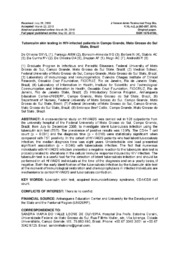Tuberculin skin testing in HIV-infected patients in Campo Grande, Mato Grosso do Sul State, Brazil.
Tuberculin skin testing in HIV-infected patients in Campo Grande, Mato Grosso do Sul State, Brazil.
Author(s): OLIVEIRA, S. M. V. L. de; PANIAGO, A. M. M.; BONECINI-ALMEIDA, M. G.; BERTONI, N.; STABILE, A. C.; CUNHA, R. V. da; OLIVEIRA, O. A. de; DRUZIAN, A. F.; NEGRI, A. C.; ANDREOTTI, R.
Summary: A cross-sectional study on HIV/AIDS was carried out in 108 outpatients from the university hospital of the Federal University of Mato Grosso do Sul, Campo Grande, Brazil, from July to December 2008, to investigate latent tuberculosis infection using the tuberculin skin test (TST). The prevalence of positive results was 13.9%. The CD4+ T cell count (p = 0.091) and the diagnosis time (p = 0.010) were statistically significant when compared with TST positivity. In the cohort of HIV/AIDS patients who had latent tuberculosis infection, the median diagnosis time was eight years. Undetectable viral load presented significant association (p = 0.046) with tuberculosis infection. The fact that numerous individuals with HIV/AIDS infection presented a negative reaction to the tuberculin skin test is probably related to alterations in the cellular immune response induced by HIV infection. The tuberculin test is a useful tool for the detection of latent tuberculosis infection and should be performed in all HIV/AIDS individuals at the time of the diagnosis and on a yearly basis, if negative. Both the early identification of the tuberculosis infection by the tuberculin skin test at the moment of immunological restoration and chemoprophylaxis in infected individuals are mechanisms to control HIV/AIDS and tuberculosis coinfection.
Publication year: 2010
Types of publication: Journal article
Unit: Embrapa Beef Cattle
Keywords: AIDS, HIV, Saúde humana, Teste tuberculínico, Tuberculose
Observation
Some of Embrapa's publications are published as ePub files. To read them, use or download one of the following free software options to your computer or mobile device. Android: Google Play Books; IOS: iBooks; Windows and Linux: Calibre.
Access other publications
Access the Agricultural Research Database (BDPA) to consult Embrapa's full library collection and records.
Visit Embrapa Bookstore to purchase books and other publications sold by Embrapa.

